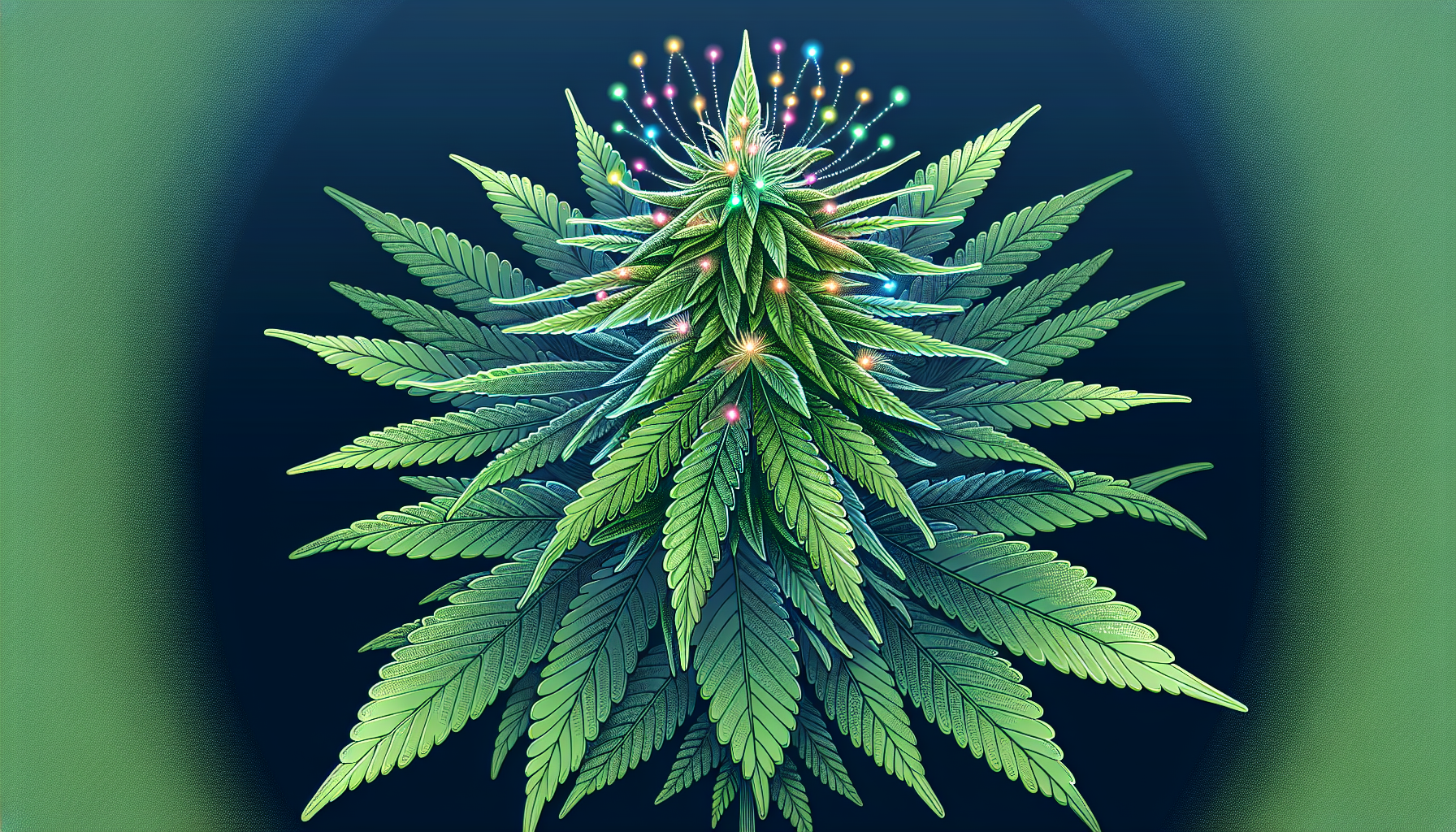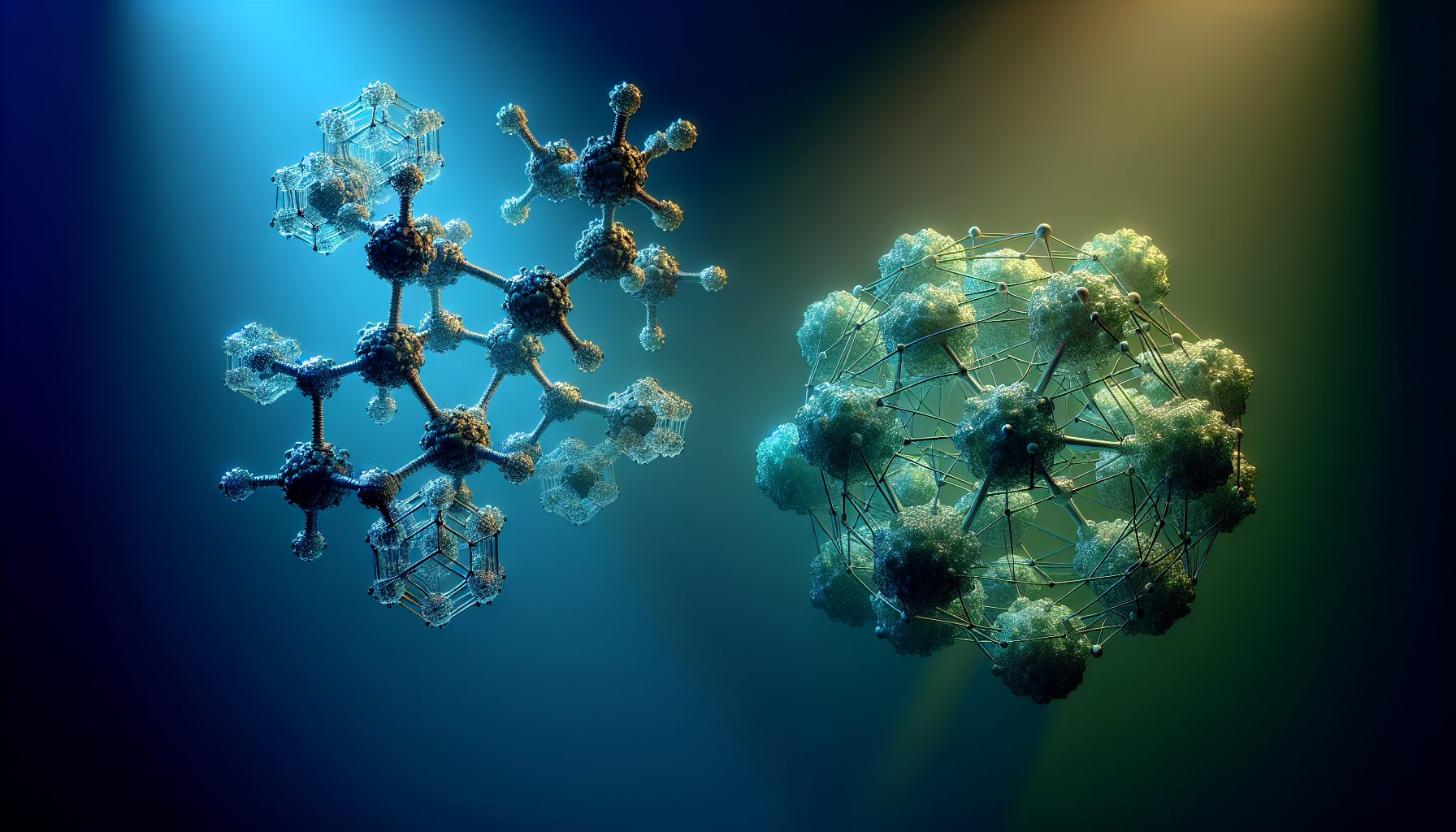Are you torn between the naturally occurring cannabinoid THC-P and THC-V? It can be a tough call, THC-P boasts remarkable potency with significant psychoactive effects, while THC-V offers milder action with the possibility of particular health benefits.
This comparative guide delivers straight-to-the-point details about their disparate impacts, helping you decide for yourself which aligns better with your needs. Expect a straightforward analysis, free from complexities as we discuss how THC-P compares to THC-V and their roles in cannabis consumption and research.
Key Takeaways
-
THC-P is a very potent compound found in the hemp plant with strong psychoactive effects and potential therapeutic uses; it is approximately 30 times more potent than Delta 9 THC
-
THC-V is also found in the hemp plant and is known for possibly suppressing appetite and offering a less psychoactive experience, which could potentially aid in weight loss and diabetes management.
-
THC-P and THC-V differ molecularly with THC-P having a longer side chain that enhances its binding affinity to the endocannabinoid system resulting in potent intoxicating effects. In contrast, THC-V’s interaction with the system leads to unique effects such as appetite suppression and the regulation of blood sugar levels.
-
Both cannabis plant compounds are subject to state-by-state legality with THC-P and THC-V derived from hemp being federally legal under the 2018 Farm Bill.
-
Consumers should check local regulations and should purchase from reputable sources with third-party lab testing like Everyday Delta.
Understanding THC-P and THC-V

THCP and THCV are two different cannabinoids found naturally in the cannabis plant. These compounds have unique molecular structures that interact with our endocannabinoid system in distinct ways. While THCP is known for its potent psychoactive effects, THCV offers mild to non-psychoactive properties, providing an entirely different experience to users. Each cannabinoid occurs naturally, making both THC-P and THC-V of great interest in the cannabis world of research.
Understanding their roles within the cannabis community is an important step in order to grasp their effects and potential therapeutic benefits. Despite being famous for its high potency, THC-P differs from CBD as it exhibits strong psychoactive properties which have garnered significant attention among researchers studying marijuana plants’ natural components.
First, let's take a look at each one of these cannabinoids' characteristics separately, from there examining factors like potential benefits, effects, side effects, dosage, and more.
What is THC-P?
THC-P and THC-O are often times compared against each other most likely because they are two of the most powerful cannabinoids found in the hemp market. In fact, they are believed to be 30 times more potent than Delta 9 THC, making them highly sought after in the cannabis world for their intense intoxicating effects.
This potency is due to their unique molecular structure that allows them to bind tightly with cannabinoid receptors. Keep in mind that THC-O is a synthetically produced cannabinoid and even though the Controlled Substances Act doesn't specifically make certain cannabinoids illegal, the DEA has stated they do consider THC-O as being an illegal controlled substance. THC-P on the on the other hand occurs naturally and is therefore viewed differently.
Given its strength, many refer to THC-P as the “super cannabinoid.” Its potential benefits may include pain relief and strong psychoactive properties, drawing interest from both consumers and researchers alike. Because of its high potency levels compared to other compounds like Delta 9 THC, it’s important for users - particularly beginners - to use caution when dosing.
What is THC-V?
Turning our attention to THC-V, this naturally occurring cannabinoid has gained recognition for its distinct qualities. In contrast to other cannabinoids, THC-V actually reduces appetite and is often referred to as ‘diet weed’. This characteristic makes it a promising possibility in assisting with weight loss treatments and the management of obesity and type 2 diabetes.
Surprisingly, THC-V may also have potential benefits such as anxiety relief and regulation of blood sugar levels. These unique effects that THC-V produces within the nervous system and the body showcase the diverse experiences and advantages offered by various cannabis products.
The Key Differences Between THC-P and THC-V

Although both THC-P and THC-V are derived from the cannabis plant, their molecular structures, potencies, and psychoactive properties differ significantly. While THC-P may be more potent than traditional THC due to its structure, researchers have found that THC-V does not produce euphoria like other cannabis products or other forms of THC.
Molecular Structure
At a microscopic level, the differences between THC-P and THC-V lie in their side chain lengths. While one has a five-carbon side chain, the other only has three carbons attached. These small differences play a large role in how they affect our human body.
The longer five-carbon side chain of THC-P allows it to securely bind to receptors within the endocannabinoid system with minimal dosage required for its effects. On the contrary, unique molecular interactions of THC-V with this system result in distinct outcomes such as influence on metabolism, appetite control and regulation of glucose levels within our body.
Potency
THC-P is widely regarded as the most powerful form of THC, due to its unique molecular makeup. Anecdotal evidence has shown it to be approximately 30 times more potent than regular THC, making it one of the strongest cannabinoids available on the market. Its high potency results in intensified psychoactive effects and requires careful usage to avoid any negative outcomes.
THC-V does not possess such strong potency levels as those seen with THC-P. It still exerts significant impacts on our body functions by regulating metabolism and suppressing appetite. This difference in potency highlights the importance of precise dosing and cautious consumption when using both types of THC products.
Psychoactive Properties
This is the biggest area these cannabinoids differ. While THC-P is known for its intense effects that can result in a strong, long-lasting euphoria, the effects of THC-V are more subtle and provide an uplifting stimulation instead. This key distinction highlights how different cannabinoids can offer unique experiences to users, making cannabis a diverse plant with potential benefits for various individuals.
This variation also demonstrates the versatility of cannabis strains and underscores why exploring different options may enhance one’s overall usage experience. Ultimately both compounds belong under the umbrella term “psychoactive”, meaning they have an impact on our mental state when consumed through ingestion or inhalation methods.
This does not necessarily indicate negative connotations nor harmful substances upon use (such discussions often arise due to largely-incorrectly-placed stigma around marijuana consumption). These differences between these closely related THC products just emphasizes how intricate nature truly is at crafting these natural compounds.
Effects and Benefits of THCP and THCV
While there are differences between THC-P and THC-V, they do share a few things in common. For starters, both have many potential benefits. However, as with any substance, in high doses they both have the potential to cause side effects like altered perception, mood changes, red eyes, dry mouth, increased heart rate, memory problems, panic attacks, and coordination issues.
Let's dive right in and explore the specific effects and benefits offered by these THC compounds.
THC-P Effects and Benefits

THC-P is often associated with an elevated mental and physical state that brings about feelings of euphoria and mental clarity. Its strong potency makes it a viable option for anyone who require high levels of THC content to produce needed or desired effects. In larger amounts, this specific compound may also produce sedative effects which could potentially benefit individuals struggling with conditions such as insomnia.
Aside from its mind-altering effects, the possible therapeutic benefits of THC-P may include reducing anxiety levels, pain relief, and relieving inflammation. Preliminary studies have also shown promise in stimulating appetite and protecting against neurological damage while providing relief from nausea and vomiting. Furthermore, THCP has been found to have mood-regulating abilities.
THC-V Effects and Benefits
THC-V, in contrast, offers its own unique properties. It has been linked to reducing appetite and increasing feelings of fullness, making it a possible candidate for weight loss and management of conditions like obesity and type 2 diabetes. While THC can stimulate the appetite, THC-V acts as an antagonist on CB1 receptors which is what may contribute to suppressing hunger.
Aside from possibly aiding with weight loss efforts, there is also potential for THC-V to provide relief from anxiety symptoms. Additionally, it could play a role in regulating blood sugar levels, which presents possibilities for managing diabetes through this compound. However, to ensure safe use, it’s crucial to consult with a healthcare professional before incorporating any substance into one’s health routine.
Legality and Availability of THC-P and THC-V

Understanding the legal landscape surrounding cannabinoids can be challenging. Just like Delta 9 THC laws, both THC-P and THC-V are subject to certain restrictions and can only be purchased in states where their use has been authorized by law.
The laws governing these specific types of cannabinoids vary from state to state, so it is important to educate yourself on the local laws and regulations of these cannabis compounds within your own jurisdiction.
According to the 2018 Farm Bill, both THC-P and THC-V are considered legal at a federal level as they are derived from the hemp plant and contain less than 0.3% Delta 9 THC on a dry weight basis.
Where to Buy THC-P and THCV Online
When looking to buy THC-P and THC-V products, online retailers like Everyday Delta is the way to go. Not only is buying THCP online more convenience but you will typically find a wider selection and better pricing online compared to your local smoke shop.
For those interested in buying THC-V and THCP gummies online, it’s crucial to first verify their legal status in your state before proceeding with a trusted seller like Everyday Delta who offers third-party lab testing on all products they carry. By purchasing from companies that provide third-party lab reports you can rest assured about the quality and purity of the products.
Always keep in mind that responsible consumption begins by acquiring top-notch goods from reliable sources.
Consumption Methods and Dosage Recommendations

After discussing the distinctions, advantages, and legal considerations of THC-P and THC-V, it is important to understand how these cannabinoids can be consumed and what dosages are recommended.
Both THCV and THCP can be taken through various methods including inhalation via vaping or smoking, oral consumption in edibles or capsules, sublingual absorption using tinctures, or topical application with creams or balms.
Due to the high potency of both THC-P and the unique effects of THCV, those new to these compounds should start with a low dose. It is best for beginners to begin microdosing THC before gradually increasing their intake of either compound as a precaution against any negative reactions.
This also allows time for individual responses from consuming these potent cannabinoids. These suggested methods and THCP dosage recommendations will help users safely experience all that marijuana’s full spectrum has on offer.
Consumption Methods
The way you consume these cannabinoids can greatly affect the speed at which they take effect and how long their effects last. For example, vaping these compounds leads to rapid absorption and a quicker onset of effects, typically within 25 minutes. Tinctures and edibles on the other hand, may take up to an hour for users to feel their effects.
THC-P vapes are known for being highly potent with a high bioavailability rate, meaning that lower dosages should be used compared to tinctures or edibles. Alternatively, consuming cannabis-infused beverages such as sodas or teas also offers a different method of consumption with longer-lasting effects due to liver metabolism. However, the specific potency and experience may vary from person-to-person depending on individual factors.
.
When using products containing THC-P or THP-V it is important not consume too much too quickly in order to avoid overconsumption. These substances have delayed onsets in some forms, so it is recommended to wait at least 2 hours before taking more.
Dosage Recommendations
It is important to be cautious when determining the appropriate dosages of THC-P and THC-V, as they have different effects and potency levels.
For beginners, it is recommended to start with 1mg-3mg of THC-P, while intermediate users may begin with 3mg-5mg. Advanced users can consider starting at a dose of 5mg-10+.
Potential Side Effects and Precautions
While the use of THC-P and THC-V has shown potential for therapeutic benefits, it is important to be aware of any possible side effects. These may include altered perception, changes in appetite stimulation or in mood, physical reactions such as red eyes, dry mouth and increased heart rate, memory problems and coordination difficulties.
It is crucial to consider these potential side effects before using either THC-P or THV-C. For those who are new users or inexperienced with cannabinoids, they should exercise caution when trying them out by starting with lower doses while being mindful of how their body responds.
Using both compounds responsibly involves proper dosing and remaining aware of one’s own reaction to ensure that these risks are minimized.
Which is Better, THCP or THCV?
We have taken a look into the very potent compound THC-P and naturally occurring cannabinoid THC-V, exploring their distinct characteristics, advantages, and legal standing. Each cannabinoid provides a unique experience and potential benefits, highlighting how versatile the cannabis plant really is and how it can cater to various user preferences and needs.
From the powerful psychoactive effects of THC-P to the potential appetite-suppressing properties of THV-C, the complexity and potential of cannabis continue to unfold. With further advancing scientific research will come an improved understanding of these exceptional cannabinoids.
Which of these compounds is right for you is a question only you can answer. Whichever you choose just be sure that it aligns with your personal goals and preferences. If you do decide to add these into your routine be sure to check out the large selection of THCV and THCP products available at Everyday Delta.
Frequently Asked Questions
Is THCP stronger than THCV?
THCP is known to possess a heightened binding affinity towards the CB1 receptor, resulting in its estimated potency being 30 times higher than regular THC. This increased potency translates into stronger and more pronounced euphoric effects even when consumed in smaller doses.
How potent is THCV?
THCV is considered to be the weakest among all cannabinoids, only possessing approximately 25% of THC’s potency. This means that it requires a larger amount of THCV compared to THC in order for one to experience psychoactive effects.
In summary, when comparing its potency with other cannabinoids, THCV falls short and can be deemed less potent than THC.
What strain is THCV?
THCV, a type of cannabinoid, can be found in popular strains like Doug’s Varin, Pineapple Purps and Durban Poison. These strains offer the option for users to experience its effects through smoking or vaping. With the increasing demand for cannabinoids, THCV is now being incorporated into other forms such as various products available on the market.
What is better THCP or HHC?
While both THCP and HHC have similar characteristics and effects, THCP is far superior due to its increased potency and intoxicating properties. It should be noted that these compounds are derived from Delta-9 Tetrahydrocannabinol (delta 9) and Delta-8 Tetrahydrocannabinol, making them related in their composition.
Are THC-P and THC-V legal?
THC-V and THC-P fall under the federally legal category according to the 2018 Farm Bill. It is crucial to consult with local regulations as state laws may differ. It’s important to always check for any applicable restrictions before consuming or possessing these substances.
*By using this website, you agree to and are subject to the following Legal Disclaimer, which is part of our Terms of Service. The information provided on this website does not and is not intended to constitute legal advice or reliable statements of the status of any laws.






